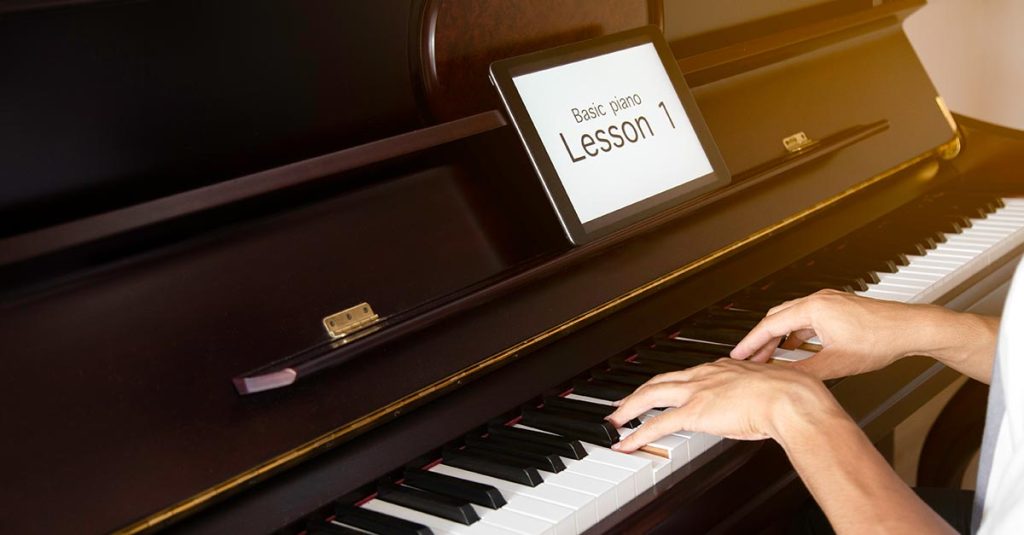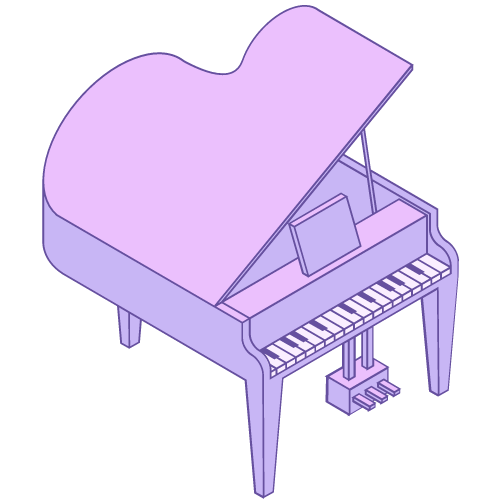Blog
10 Common Mistakes to Avoid When Learning Piano
Learning the piano is a fulfilling and rewarding journey, but it’s also a process that requires discipline, patience, and an understanding of the fundamentals. Many beginners make mistakes along the way, which can hinder progress and create bad habits. While making mistakes is a natural part of learning, avoiding certain common errors can help you progress faster, build proper technique, and enjoy the process more fully. Here are 10 common mistakes to avoid when learning the piano:
1. Ignoring Proper Hand and Finger Position
One of the most fundamental aspects of playing the piano is proper hand and finger positioning. Many beginners tend to curl their fingers or play with stiff wrists, which can lead to poor technique and even injury over time.

How to Avoid It:
- Maintain relaxed hands and fingers: Your fingers should be curved, with your knuckles slightly raised, and your wrist should remain level with the keyboard.
- Use the pads of your fingers: Play with the pads of your fingers rather than the flat parts or tips.
- Keep your hands relaxed: Tension can limit your ability to play smoothly and can cause strain. Keep your arms and shoulders relaxed while you play.
Why It’s Important: Proper finger and hand positioning helps you play with ease, control, and efficiency. It also prevents unnecessary strain, which is crucial for avoiding long-term injury.
2. Skipping Music Theory
Many beginners are eager to jump straight into playing songs they love, without understanding the basic music theory behind the music. While playing songs is fun, skipping over theory can limit your ability to read sheet music, understand the structure of songs, and improvise.
How to Avoid It:
- Start with the basics: Learn the fundamentals of music theory, including reading sheet music, understanding scales, intervals, chords, and basic time signatures.
- Learn how music works: Understand how melodies, harmonies, and rhythms fit together to create a song. This knowledge will help you recognize patterns and play by ear.
Why It’s Important: A strong foundation in music theory will make it easier to learn new pieces, understand how different songs are structured, and improve your overall musicianship.
3. Focusing Too Much on Speed
Many beginners make the mistake of trying to play faster than they are capable of. Speed should come naturally after you’ve mastered the basics of a piece and developed control over your technique.
How to Avoid It:
- Practice slowly: Always start learning a new piece at a slow tempo, even if you already know how it sounds. Focus on playing accurately and with proper technique first.
- Gradually increase speed: Once you’re comfortable with a piece at a slow speed, you can gradually increase the tempo, but don’t rush it.
Why It’s Important: Playing too fast too soon can lead to mistakes, poor technique, and frustration. Focusing on accuracy and control first will ensure that you play well, even when you eventually speed up.
4. Not Practicing Regularly
Consistency is key when learning any musical instrument, including the piano. Many beginners practice sporadically or only play when they feel inspired, which can slow down their progress.
How to Avoid It:
- Set a regular practice schedule: Try to practice at least 20–30 minutes every day. Consistency, even with shorter practice sessions, is more effective than longer, irregular sessions.
- Stay disciplined: Treat practice time as a regular commitment, even if you’re feeling tired or uninspired. Over time, the discipline will become second nature.
Why It’s Important: Regular practice helps build muscle memory, reinforces concepts, and keeps you progressing steadily. Skipping practice sessions leads to stagnation and can make learning more difficult.
5. Not Breaking Pieces Into Smaller Sections
When learning a new piece of music, many beginners attempt to play the entire song from start to finish without breaking it down into manageable sections. This often leads to frustration and poor results.

How to Avoid It:
- Divide the piece into sections: Focus on learning one phrase or section at a time. Master each section before moving on to the next.
- Practice hands separately: If you’re struggling with a difficult section, try practicing each hand separately until you’re comfortable with both parts.
Why It’s Important: Breaking a piece down into smaller sections allows you to focus on each part individually, ensuring accuracy and better overall performance. It also makes it easier to identify and fix mistakes.
6. Overlooking Timing and Rhythm
Many beginners focus so much on playing the right notes that they forget to pay attention to the timing and rhythm. This can lead to playing pieces too quickly, too slowly, or inconsistently.
How to Avoid It:
- Use a metronome: A metronome will help you keep a steady tempo and develop a good sense of timing. Start with a slow tempo and gradually increase it as you become more comfortable.
- Count aloud: Counting the beats out loud while you play helps reinforce rhythm and ensures that you’re staying in time.
Why It’s Important: Rhythm is the foundation of all music. Playing in time is crucial for making a piece sound cohesive and polished.
7. Relying Too Much on Sheet Music
While reading sheet music is an essential skill, relying solely on it can limit your ability to improvise, play by ear, and understand music in a more intuitive way.
How to Avoid It:
- Learn to play by ear: Practice listening to songs and trying to replicate them on the piano. Start with simple melodies and gradually work your way up to more complex pieces.
- Improvise: Once you’re comfortable with the basics, try improvising or adding your own variations to songs you know. This helps deepen your musical understanding.
Why It’s Important: Being able to play without sheet music gives you greater freedom and creativity. It also helps you develop a deeper connection to the music, making you more versatile as a pianist.
8. Not Focusing on Dynamics and Expression
Many beginners play the piano too mechanically, focusing on hitting the right notes without considering the dynamics (volume) and expression (emotion) of the piece. This can result in music that sounds flat or robotic.
How to Avoid It:
- Pay attention to dynamics: Many pieces will include instructions for dynamics (e.g., “piano” for soft, “forte” for loud). Be mindful of these notations and incorporate them into your playing.
- Add emotion: Think about the mood of the piece and try to convey that feeling through your dynamics and phrasing. Play with more expression as you become more comfortable.
Why It’s Important: Dynamics and expression add color and depth to music. They help turn a technically correct performance into a compelling and emotive one.
9. Not Using Proper Pedal Technique
Improper use of the piano pedal is a common issue among beginners. Using the pedal incorrectly can result in muddled, unclear sound and detract from the overall performance.
How to Avoid It:
- Use the pedal sparingly: The pedal should only be used when necessary, such as to connect chords or sustain notes. Avoid over-pedaling, which can cause a “blurry” sound.
- Learn to coordinate your feet and hands: Practice pressing the pedal at the right time to enhance your performance, without relying on it to cover up mistakes.
Why It’s Important: Proper pedal technique enhances the sound of your playing and adds richness, but overuse can make the music sound sloppy. Mastering pedal control will improve the clarity and depth of your playing.
10. Comparing Yourself to Others
It’s easy to fall into the trap of comparing your progress to other pianists, especially with social media showcasing the highlights of musicians’ achievements. This can lead to frustration and self-doubt.
How to Avoid It:
- Focus on your personal progress: Instead of comparing yourself to others, focus on how far you’ve come since you first started playing the piano. Celebrate small victories along the way.
- Set realistic goals: Set achievable short-term goals that will help you track your progress and stay motivated.
Why It’s Important: Comparing yourself to others can create unnecessary stress. Everyone learns at their own pace, and what’s most important is your personal growth and enjoyment of music.
Conclusion: Play Smart and Avoid Common Mistakes
Avoiding these common mistakes can make your learning process more enjoyable and efficient. As you progress on your piano journey, remember that it’s not about how fast you learn, but about developing solid technique, understanding music, and enjoying the process. By focusing on proper hand positioning, practicing regularly, breaking pieces into sections, and understanding music theory, you’ll set yourself up for long-term success as a pianist. Stay patient, stay disciplined, and, most importantly, have fun making music!


